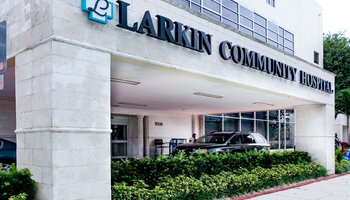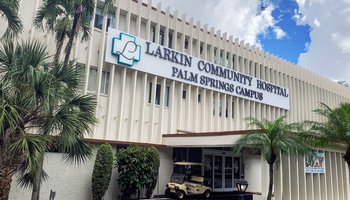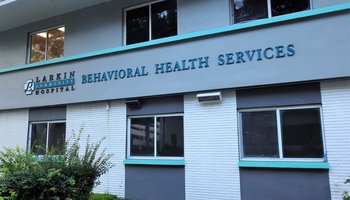- Home »
- Treatments & Services »
- Addiction Medicine (Substance Abuse) »
- Inpatient Detox »
- Opioid Detox
Help is Available
Opioid Detox Services
Larkin Health Systems offers inpatient opioid detoxification services to meet each patient’s individual and medical recommendations.
Opioid Detox Hospitals South Florida
Opioids are highly addictive substances that stimulate opioid receptors in the brain to produce feelings of euphoria and block pain. Oxycodone, hydrocodone, fentanyl, heroin, and other types of painkillers are all opiate and opioid substances. Addiction to opioids, including the misuse of prescription pain relievers, is a serious national crisis that affects public health, as well as social and economic welfare.
If you, or someone you know, are addicted to opioids or opiates, Larkin Health Systems’ Opioid Detox Hospitals in South Florida are here to help you and your loved ones throughout the detox process.
Opioid Detox
If you, or someone you know, are addicted to opioids or opiates and would like to commit to a life of sobriety, medical opioid detoxification is the first step to clean living. Coming to grips with the physical and psychological reality of addiction and sobriety can be difficult. You may feel confusion, fear, or desperation. That is normal. Stay focused and commit yourself to a life free from addiction. Read on for more information regarding inpatient opioid detoxification and opioid withdrawal.
What is Opioid Detox?
Inpatient opioid detoxification is the medical process of tapering a person with an opioid or opiate addiction off of the narcotic under medical and psychiatric supervision. By gradually replacing the addictive substance with prescription medications and other coping mechanisms our health care providers are able to manage withdrawal symptoms as patients go through the medical detox.
Opioid detox would be difficult, if not impossible, for patients to gage and control on their own, due to the intensity of opioid withdrawal symptoms. That is why we created our inpatient opioid detoxification program to help the body safely and successfully rid itself of opioids and to minimize the effects of opioid withdrawal.
Medical detox from opioids helps patients physically and mentally prepare to successfully proceed to the next step in the treatment process, such as residential treatment centers, partial hospitalization programs, and intensive outpatient programs. This decreases chances for relapsing and increases chances for long-term sobriety.
Opiates Vs. Opioids
The main distinction between opioids and opiates is the compound from which it is derived. Opiates are produced from Opium Poppy plants, while opioids are chemically or synthetically derived. There are, however, variants of opiates that are synthetic.
It is important to mention that just because opiates are derived from natural sources that does not make them less harmful to people. In fact, opiates are just as addictive and misused as opioids.
What are Opioids?
Opioids are a subset of narcotics that are used for pain relief following surgery, injury, or chronic or acute pain due to a disease. While opioids relieve pain effectively, they can also be very addictive. The risk of addiction increases when opioids are taken over long periods of time. Opioids trick your brain into believing that the substance is necessary for survival. As mentioned, opioids are chemically created.
Types of Opioids
There are two types of opioids:
- Semi-synthetic
- Oxycodone
- Hydrocodone
- Hydromorphone
- Oxymorphone
- Synthetic
- Fentanyl
- Methadone
What are Opiates?
Opiates are a subset of opioids that are used for pain management. Opiates are typically derived from Opium Poppy plants.
Types of Opiates
- Antagonists
- Naltrexone
- Naloxone
- Agonists
- Morphine
- Fentanyl
- Hydrocodone
- Oxycodone
- Heroin
- Buprenorphine)
OPIOID WITHDRAWAL
Opioid Withdrawal should be treated by a healthcare professional.
Withdrawal Treatment Plan
While patients are withdrawing from their addiction, our Board Certified physicians monitor their vital signs and administer replacement medications appropriately. The first stage of treatment includes providing longer-acting opioids, such as Suboxone, to mitigate withdrawal symptoms. Prescribed medications normalize the chemistry of the brain while blocking the euphoric effects of opioids. Controlled medications can also reduce physiological cravings and normalize bodily functions.
During withdrawal, our psychiatrists provide psychological services to help patients overcome the mental and behavioral issues caused by addiction. Patients can expect to be at our facility for around three days, or until severe withdrawal symptoms have subsided. We coordinate smooth transitions of care to residential treatment centers to help you in your next stage of treatment.
Frequently Asked Questions
The Opioid System is controlled by three receptors in the human body. The mu, delta, and kappa receptors, commonly referred to as the opioid receptors. These receptors combine to control how we perceive and act on pain, reward and addiction. Opioids stimulate these receptors and relieve pain, cause sedation, and a feeling of euphoria. This is why they can be dangerous if not used correctly. Some common side effects of opioid use are tolerance, addiction, constipation, physical dependance, and respiratory depression.
Opioid overdose is also common and according to the CDC "over 70% of the nearly 71,000 drug overdose deaths in 2019 involved an opioid." (Matson CL, 2021) link
Opioid receptors
Opioids stimulate the mu, delta and kappa receptors in the body, which control pain, reward and addiction.Due to the euphoric effects of opioids, they can misused as a recreational drug. The repeated use of opioids can lead to tolerance and dependance on the substance. As the body becomes more acclimated to the effects of opioids, managing pain will require higher and higher doses. Eventually, sensitivity will be heightened and things that weren't painful before, might cause discomfort.
Addiction to any substance can be dangerous. Opioids depress or slow down the respiratory, central nervous, and gastro-intestinal systems. Opioids require an increased dosage in order to attain a similar high with each use. Due to the nature of opioid addiction, there is a likelihood that a patient will eventually overdose on the narcotic, which can cause the patient to stop breathing, resulting in a fatal accidental overdose.
In addition to decreased breathing, opioid overdose can cause coma, stupor, and pulmonary edema (fluid in the lungs). Patients can also suffer adverse effects if they mix opioids with other substances like alcohol or other medications, which can happen either accidentally or intentionally.
Opioid detoxification, while difficult, is generally not life-threatening. However, it is fair to mention that opioid detoxification can cause serious physiological stress. Some patients become dehydrated from vomiting and diarrhea. While others get tachycardia (rapid heartbeat). This can lead to patients developing potentially fatal side effects, if not monitored properly.
Withdrawal symptoms depend on a patient’s tolerance to opioids. However, there is a typical pattern that can be observed oncethe abused substance is no longer in the system:
Stage 1: 6-24 hours after last drug usage
Duringthe firststage of opioid detox, medication is prescribed to ease patients into withdrawal. Some Stage 1 symptoms include:
Intensified cravings
Anxietyand/or depression
Nausea and/or vomiting
Stage 2:36-48 hours after last drug usage
Duringthe second stage of opioid detox, medication is usually increased to the maximum allowed dosage. This is done to help patients get through the mostchallenging phase in which drug cravings become unmanageable without supervision and medication. Some Stage 2 symptoms include:
Abdominal cramps
Nausea and/or vomiting
Sweating profusely
Stage 3: 48-72 hours after last drug usage
During the third stage of opioid detox,medication is administered at maximum dosage levels and is gradually decreased. This is saidto be the most uncomfortable stage and requires patient supervision to ensure that patients do not relapse. Some Stage 3 symptoms include:
Insomnia
Diarrhea
Muscle pain and tremors
Opioid withdrawal symptoms can be uncomfortable, but knowing what those symptoms are, in advance, can help patients deal with them when they arise. Withdrawal symptoms typically begin 6 to 24 hours after the last usage of drugs. The onset of withdrawal symptoms may range depending on whether a short-acting opioid or long-acting opioid was taken. Short-acting opioid withdrawal symptoms can occur 6 to 24 hours after last use; long-acting opioid withdrawal symptoms may take 12 to 48 hours to begin. The severityof withdrawal symptoms can fluctuate depending on how chemically dependent the person is. Dependence and tolerance increases the longer a drug is used and if large quantities are taken. Opioid withdrawal symptoms include:
Withdrawal Management
- Hypersensitivity to pain
- Runny nose
- Hallucinations
- Seizures
- Goosebumps or chills
- Pain (hyperalgesia)
- Sneezing
- Dilated pupils and/or blurry vision
- Abdominal cramping
- Irritability or feeling uncomfortable
- Excessive sweating
- Insomnia
- Restlessness
- Anxiety
- Tachycardia (rapid heartbeat)
The First Step Towards a Life of Sobriety
Once medical detox is completed patients transition into residential treatment and opioid medication-assited treatment. In this stage of treatment, patients feel better physically and mentally and have a renewed sense of purpose in life.
If you are ready to live a more positive and healthy lifestyle; call our medical detoxification program team to discuss your options for opioid addiction treatment.
Live Free
From Opioid Addiction, Take The First Step Now.
Facilities
Opioid Detox | Larkin Health Please Visit or Call The Following Facilities.
Physicians
Physicians Treating Opioid Detox | Larkin Health.



